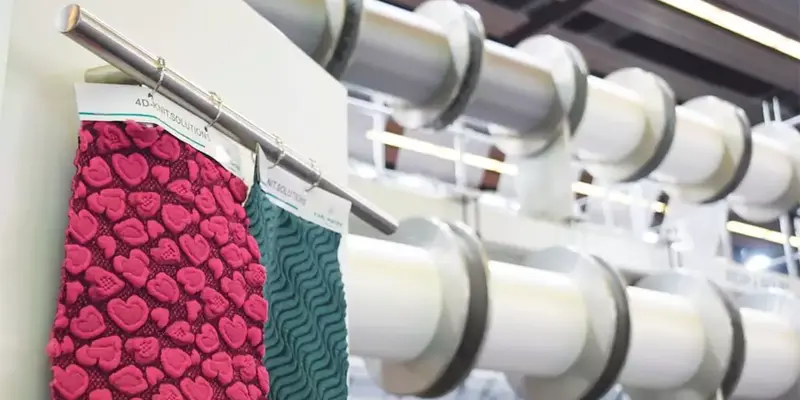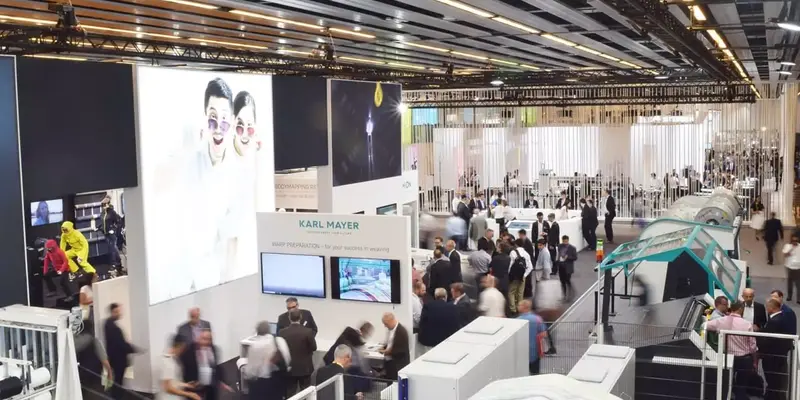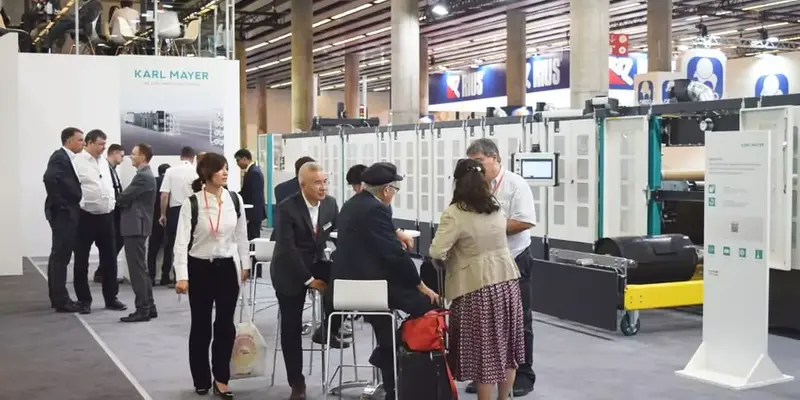Recently, KARL MAYER GROUP North America hosted its debut Textiles Innovation Conference, aiming to forge vital connections within the U.S. textile manufacturing sector.
The process of transporting and setting up textile manufacturing machinery at North American trade shows is often fraught with challenges and high expenses. While machine manufacturers are hospitable to visitors at their facilities, there’s a need to nurture sustained interest.
This is compounded by the infrequency of major events like the International Textile Machinery Association (ITMA), which occurs only once every four years. Consequently, textile machinery manufacturers continually seek fresh avenues to showcase their latest advancements. The recent Karl Mayer Stoll Textiles Innovation Conference showcased the Karl Mayer Group’s commitment, taking this endeavor to a notably higher echelon.
Held at their North American headquarters in Greensboro, N.C., the event bore the distinct ambiance of a boutique trade show. Matthew Llewellyn, director of sales and marketing for Stoll by Karl Mayer, reflected on their inaugural event: “Last year marked our initial foray, centered solely on the Stoll weft knit product line. Despite its modest scale, the positive participant feedback prompted us to expand our horizons.”
He continued, “This year, we broadened the conference, encompassing Karl Mayer’s warp knitting technologies. We also curated a broader exhibitor list spanning the entire supply chain, aiming for an ecosystem-driven event.”
Mariano Amezcua, president of Karl Mayer North America, emphasized, “Our vision was beyond just a Karl Mayer or Stoll affair. It was a platform to spotlight the textile community, emphasizing the interdependence of all industry facets. The synthesis of the entire supply chain is paramount in product creation, and our intent was to foster connections across industry segments.”
Throughout the three-day event, attendees immersed themselves in diverse presentations, engaged with exhibitors representing varied industry sectors, and witnessed demonstrations of cutting-edge warping and knitting machines.
Diverse Insights, Unified Themes
The presentations covered a spectrum of topics, with knitting emerging as a central theme. Key highlights included:
Donna Brin, president of Bfive40, highlighted the efficiency of 3D knitting technologies in minimizing waste and processing steps. Emphasizing its transformative potential, she underlined how 3D knitting streamlines production processes, addressing critical labor constraints across the industry.
Tomas Infantes Schnoor, service manager for technical textiles at Karl Mayer, addressed industry-wide challenges of vanishing expertise, underscoring Karl Mayer/Stoll’s initiative to establish a North American academy for training, ensuring the preservation and dissemination of industry knowledge.
Kayla Franklin, assistant trade marketing manager at Unifi Inc.’s Repreve® brand, shed light on Repreve’s sustainability achievements, recycling over 35 billion plastic bottles into Repreve fiber, substantially reducing carbon emissions and water consumption.
Reid Hix, sales and business development manager for Karl Mayer, showcased warp knit variations rivaling traditional woven fabrics, emphasizing their superior performance in speed and durability.
Andre West, director of the Zeis Textile Extension at North Carolina State University, unveiled the Flex Factory Prototype Lab, focusing on product and application development.
Exhibitors, Demonstrations, and Networking
Exhibitors represented various supply chain aspects, fostering collaborative opportunities. Wolfgang Philipps from Priority Designs hailed the event for connecting suppliers, potential customers, and offering insights into cutting-edge technologies.
Feedback lauded the event’s execution and diverse insights. Lauren Street from Kent State University appreciated the exposure to diverse industry sectors and technological applications.
Forrest Sloan from Kuraray emphasized the event’s value in engaging with high-end textile experts and understanding product developments.
The Karl Mayer Group aimed to create an inclusive atmosphere, enabling engagement without obligatory fees, resulting in a diverse participant base. This mix of industry representatives and hands-on workers fostered rich networking experiences, akin to a curated show with attendees culled from various industry segments.
Looking Forward
Matthew Llewellyn and Mariano Amezcua affirmed their commitment to hosting similar annual events, incorporating feedback for continual enhancements. Future iterations may include facility tours and increased cross-sector collaborations within the textile supply chain.
Amezcua expressed plans to involve key brands from apparel, footwear, and furniture industries, focusing on their needs and integrating automation for innovative, high-margin products.
In essence, the Textiles Innovation Conference stands as a testament to industry collaboration, driving collective success through interconnectedness and shared innovation.






















